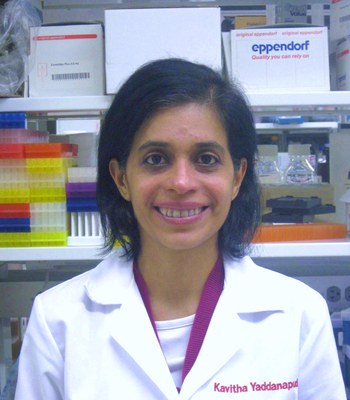Kavitha Yaddanapudi, Ph.D.
Education:
B.S., Osmania University, Hyderabad, India, 1996
M.S., Madurai Kamaraj University, Madurai, India, 1998
Ph.D., Immunology, Indian Institute of Science, Bangalore, India, 2003
Postdoctoral Fellowship, Columbia University, New York, NY, 2009
Curriculum Vitae
Current Positions:
Associate Professor, Department of Medicine, University of Louisville School of Medicine
Associate Scientist, James Graham Brown Cancer Center
Associate Faculty Member, Department of Microbiology & Immunology, University of Louisville School of Medicine
Contact Information:
Clinical Translational Research Building, Room 405
University of Louisville
505 Hancock St.
Louisville, KY 40202, USA
Phone 502-852-8643
Fax (502) 852-3661
Email: kavitha.yaddanapudi@louisville.edu
Research Description:
Dr. Yaddanapudi’s lab is focused on developing novel immune-based strategies for the treatment of cancer. Early-stage research in the lab has highlighted the potential use of embryonic stem cell antigens as a novel immunotherapeutic approach to vaccinate against cancer. Current efforts in the lab are focused on unraveling the mechanism of action of this vaccine and evaluating its potential use in preventing cancer relapse.
The second major focus of the lab is investigating the role of Macrophage Inhibitory Factor (MIF), a soluble cytokine, in modulating the immunosuppressive myeloid cells within the tumor microenvironment in mice and in cancer patients. Prior studies show that both tumor-derived and systemically circulating MIF drive both innate and adaptive immune responses towards tumor enabling phenotypes resulting in immune tolerance and cancer progression. Current efforts are directed towards breaking this MIF-driven immunosuppression in cancer-bearing hosts using small molecule inhibitors of MIF.
In addition, galectin-1 (Gal-1), a binding protein produced by cancer cells, implicated in promoting tumor immune escape by suppressing cancer-specific killer T cells, is being pursued as a drug target. Current projects in the lab aim to identify selective ligands that bind to Gal-1 and investigate whether blocking Gal-1 with small molecule inhibitors can enhance cancer control.
Literature Cited:
- Kavitha Y, Manjunath R. (2004) Induction of MHC 1 and thymic depletion due to replication of JEV in mouse brain. Arch Virol 149:2079-93. PMID: 15503198
- Yaddanapudi K, Palacios G, Towner JS, Nichol ST, Chen I, Sariol CA, Lipkin WI. (2006) Implication of a retrovirus-like glycoprotein peptide in Ebola virus and Marburg virus immunopathogenesis. FASEB J 20:2519-30. PMID: 17023517
- Kavitha Y, Manjunath R. (2007) Replication of JEV in mouse brain induces alterations in lymphocyte response. Acta Virol 51:179-87. PMID: 18076308
- Abraham S, Yaddanapudi K, Thomas S, Damodaran A, Ramireddy B, Manjunath R. (2008) Nonclassical MHC-I and Japanese encephalitis virus infection: induction of H-2Q4, H-2T23 and H-2T10. Virus Res 133:239-49. PMID: 18314211
- De Miranda J, Yaddanapudi K, Hornig M, Lipkin WI. (2009) Astrocytes recognize intracellular polyinosinic-polycytidylic acid via MDA-5. FASEB J 23:1064-71. PMID: 19036857
- Yaddanapudi K, Hornig M, Serge R, De Miranda J, Baghban A, Villar G, Lipkin WI. (2010) Passive transfer of streptococcus-induced antibodies reproduces behavioral disturbances in a mouse model of Pediatric Autoimmune Neuropsychiatric Disorders Associated with Streptococcus (PANDAS). Mol Psychiatry (Nature Publishing Group) 15:712-27. PMID: 19668249
- De Miranda J*, Yaddanapudi K*, Hornig M, Villar G, Serge R, Lipkin WI. (2010) Gestational induction of TLR3-mediated immunity inhibits cortical neurogenesis and causes behavioral disturbances. MBio. Oct 5;1(4). pii: e00176-10. PMID: 20941330 *Contributed Equally.
- Yaddanapudi K,De Miranda J, Hornig M, Lipkin WI. (2011) Toll-like receptor 3 regulates neural stem cell proliferation by modulating the Sonic Hedgehog pathway. PLoS One.Oct 25; 6(10):e26766. PMID: 22046349
- Yaddanapudi K,Mitchell RA, Putty K, Willer S, Sharma RK, Yan J, Bodduluri H and Eaton JW. (2012) Vaccination with Embryonic Stem Cells Protects against Lung Cancer: Is a Broad-Spectrum Prophylactic Vaccine against Cancer Possible? Plos One; (7):e42289. PMID: 22860107
- Brock SE, Rendon BE, Yaddanapudi K and Mitchell RA. (2012) Negative regulation of AMP-activated protein kinase (AMPK) activity by macrophage migration inhibitory factor (MIF) family members in non-small cell lung carcinomas. J Biol Chem. Nov 2; 287(45):37917-25. PMID: 22988252
- Yaddanapudi K* and Eaton JW*. (2012) Multi-peptide immunotherapeutic vaccine for renal cell carcinoma: getting the troops all worked up. Transl Androl Urol. 1(4):229-233. DOI:10.3978/j.issn.2223-4683.2012.10.03. *Corresponding author PMID: 25221745
- Yaddanapudi K*, Putty K, Rendon BE, Lamont GL, Faughn JD, Satoskar A, Lasnik A, Eaton JW and Mitchell RA*. (2013) Control of tumor-associated macrophage alternative activation by MIF. J. Immunol. Mar 15; 190 (6). PMID: 23390297 *Corresponding author
- Yaddanapudi K, Mitchell RA and Eaton JW. (2013) Cancer vaccines: Looking to the future. Oncoimmunol.2 (3); Mar. 2013; eLocation ID: e23403. PMID: 23802081
- Mitchell RA and Yaddanapudi K. (2014) Stromal-dependent tumor promotion by MIF family members. Cell Signal. Sep 30; 26(12). PMID: 25277536
- K. Yaddanapudi, B.E. Rendon, G. Lamont, E.J. Kim, N. Al Rayyan, J. Richie, S. Albeituni, S. Waigel, A. Wise and R.A. Mitchell (2014) MIF is necessary for human melanoma MDSC induction and immune suppressive function. (Submitted)
 Facebook
Facebook Twitter
Twitter Linkedin
Linkedin